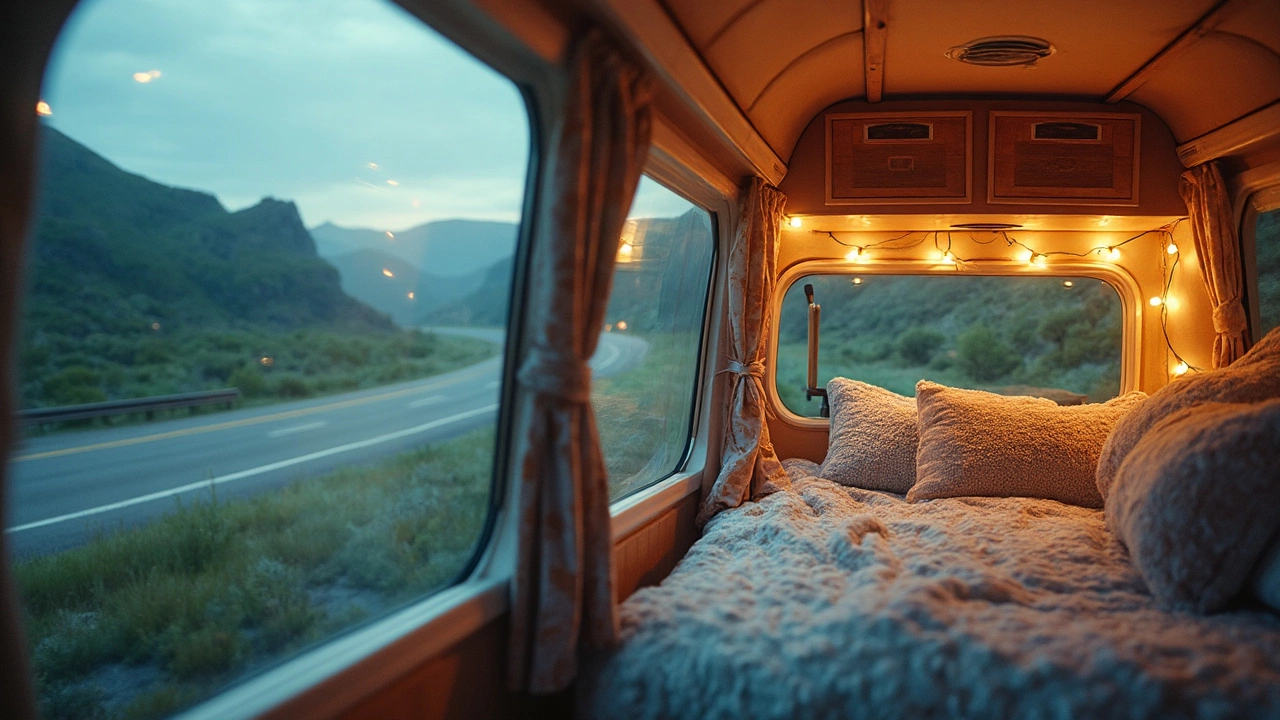Sleeping in a Motorhome: Easy Ways to Get a Good Night's Rest
When the wheels stop, the last thing you want is a restless night. Whether you’re parked at a campsite in Nottinghamshire or a wild spot in the Peak District, a comfortable sleep set‑up makes the whole trip feel worth it. Below are the must‑do steps that turn any motorhome into a cosy bedroom without blowing your budget.
Pick the Right Mattress and Bedding
The biggest factor is the sleeping surface. Most motorhomes come with a built‑in mattress that can be a little thin. If you can, upgrade to a high‑density foam pad that fits the dimensions of your bed. Foam holds its shape even on uneven ground and adds a layer of insulation against cold air that seeps in through the chassis.
Choose breathable sheets – cotton or linen work best – and add a lightweight down or synthetic comforter. In summer, a thin, moisture‑wicking blanket keeps you cool; in winter, a heavier duvet paired with a fleece sleeping bag liner traps extra warmth.
Level the Rig and Secure the Bed
A level platform is essential for both comfort and safety. Use the built‑in levelling jacks or wheel chocks to get the motorhome as flat as possible. When the bed is level, you won’t feel the bumps that cause aches in the morning.
Secure any folding beds or mattress extensions with the provided straps. A loose mattress can slide during a short drive or when the wind picks up, risking injury.
Control Temperature and Airflow
Temperature swings are common on the road. In colder months, run a portable power station with a low‑wattage heater or plug a 12 V heater into your RV’s power outlet. Make sure the heater has an automatic shut‑off feature to avoid fire risk.
For hot nights, install a vent fan or open a roof vent slightly. A battery‑powered fan creates a gentle cross‑draft that keeps humidity down without draining the battery. If you have a roof‑top solar panel, you can even run a small fan all night with minimal power loss.
Blackout curtains are a game‑changer. They block street lights, keep early sunrise from waking you up, and add an extra layer of insulation. Clip‑on curtains are easy to install and remove when you’re on the move.
Reduce Noise and Light Distractions
Motorhomes can amplify outside sounds. A simple solution is to place a rolled‑up towel or a small foam pad under the mattress to dampen vibrations from the chassis. Earplugs work well if you’re a light sleeper.
Use a small, battery‑operated night light with a red glow instead of a bright white lamp. Red light preserves night‑time melatonin levels, so you’ll feel more rested when you wake up.
Safety First
Never sleep in a moving motorhome – UK law says you must be seated with a seatbelt while the vehicle is in motion. Also, keep a smoke detector and a carbon monoxide alarm in the sleeping area. Test them monthly and replace batteries as needed.
If you’re using a portable power station, follow the manufacturer’s guidelines for ventilation. Lithium‑ion units can get hot, and proper airflow prevents overheating.
Smart Storage for Night‑Time Comfort
Clutter can make the sleeping area feel cramped. Store extra pillows, blankets, and clothing in under‑bed drawers or overhead cabinets. Keep a small bag with a toothbrush, face wash, and a bottle of water within arm’s reach – no need to get up in the middle of the night.
Finally, plan your campsite location wisely. Choose a spot that’s flat, shaded if it’s summer, and away from noisy roadways. A good spot reduces the need for extra cooling or heating, saving battery life and keeping your sleep quality high.
With these simple steps – a proper mattress, level rig, temperature control, light blocking, and safety checks – you’ll wake up refreshed and ready to explore the next corner of Nottinghamshire or wherever the road takes you.
